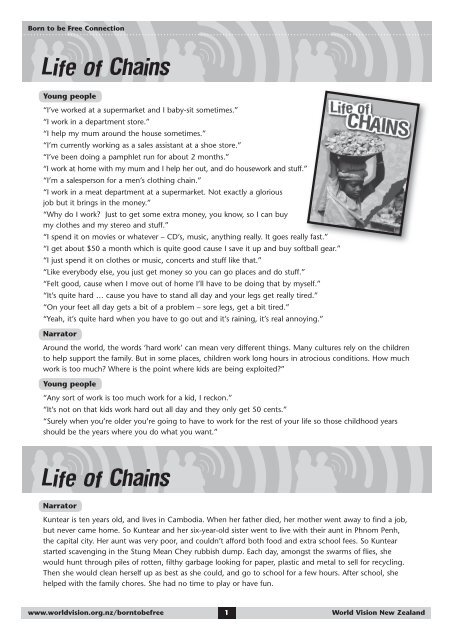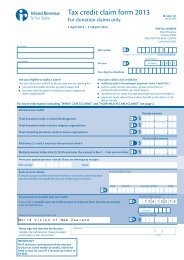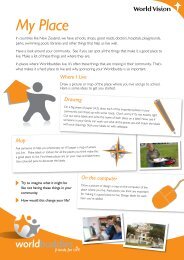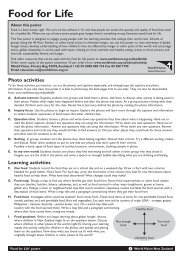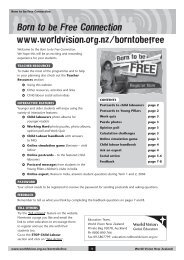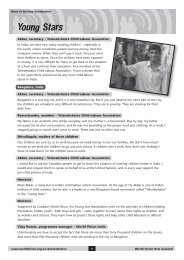Life of Chains script - Born to be Free - World Vision New Zealand
Life of Chains script - Born to be Free - World Vision New Zealand
Life of Chains script - Born to be Free - World Vision New Zealand
Create successful ePaper yourself
Turn your PDF publications into a flip-book with our unique Google optimized e-Paper software.
<strong>Born</strong> <strong>to</strong> <strong>be</strong> <strong>Free</strong> Connection<br />
<strong>Life</strong> <strong>of</strong> <strong>Chains</strong><br />
Young people<br />
“I’ve worked at a supermarket and I baby-sit sometimes.”<br />
“I work in a department s<strong>to</strong>re.”<br />
“I help my mum around the house sometimes.”<br />
“I’m currently working as a sales assistant at a shoe s<strong>to</strong>re.”<br />
“I’ve <strong>be</strong>en doing a pamphlet run for about 2 months.”<br />
“I work at home with my mum and I help her out, and do housework and stuff.”<br />
“I’m a salesperson for a men’s clothing chain.”<br />
“I work in a meat department at a supermarket. Not exactly a glorious<br />
job but it brings in the money.”<br />
“Why do I work? Just <strong>to</strong> get some extra money, you know, so I can buy<br />
my clothes and my stereo and stuff.”<br />
“I spend it on movies or whatever – CD’s, music, anything really. It goes really fast.”<br />
“I get about $50 a month which is quite good cause I save it up and buy s<strong>of</strong>tball gear.”<br />
“I just spend it on clothes or music, concerts and stuff like that.”<br />
“Like everybody else, you just get money so you can go places and do stuff.”<br />
“Felt good, cause when I move out <strong>of</strong> home I’ll have <strong>to</strong> <strong>be</strong> doing that by myself.”<br />
“It’s quite hard … cause you have <strong>to</strong> stand all day and your legs get really tired.”<br />
“On your feet all day gets a bit <strong>of</strong> a problem – sore legs, get a bit tired.”<br />
“Yeah, it’s quite hard when you have <strong>to</strong> go out and it’s raining, it’s real annoying.”<br />
Narra<strong>to</strong>r<br />
Around the world, the words ‘hard work’ can mean very different things. Many cultures rely on the children<br />
<strong>to</strong> help support the family. But in some places, children work long hours in atrocious conditions. How much<br />
work is <strong>to</strong>o much? Where is the point where kids are <strong>be</strong>ing exploited?”<br />
Young people<br />
“Any sort <strong>of</strong> work is <strong>to</strong>o much work for a kid, I reckon.”<br />
“It’s not on that kids work hard out all day and they only get 50 cents.”<br />
“Surely when you’re older you’re going <strong>to</strong> have <strong>to</strong> work for the rest <strong>of</strong> your life so those childhood years<br />
should <strong>be</strong> the years where you do what you want.”<br />
<strong>Life</strong> <strong>of</strong> <strong>Chains</strong><br />
Narra<strong>to</strong>r<br />
Kuntear is ten years old, and lives in Cambodia. When her father died, her mother went away <strong>to</strong> find a job,<br />
but never came home. So Kuntear and her six-year-old sister went <strong>to</strong> live with their aunt in Phnom Penh,<br />
the capital city. Her aunt was very poor, and couldn’t afford both food and extra school fees. So Kuntear<br />
started scavenging in the Stung Mean Chey rubbish dump. Each day, amongst the swarms <strong>of</strong> flies, she<br />
would hunt through piles <strong>of</strong> rotten, filthy garbage looking for paper, plastic and metal <strong>to</strong> sell for recycling.<br />
Then she would clean herself up as <strong>be</strong>st as she could, and go <strong>to</strong> school for a few hours. After school, she<br />
helped with the family chores. She had no time <strong>to</strong> play or have fun.<br />
www.worldvision.org.nz/born<strong>to</strong><strong>be</strong>free<br />
1<br />
<strong>World</strong> <strong>Vision</strong> <strong>New</strong> <strong>Zealand</strong>
<strong>Born</strong> <strong>to</strong> <strong>be</strong> <strong>Free</strong> Connection<br />
Scenes in a fireworks fac<strong>to</strong>ry in India, children filling fireworks tu<strong>be</strong>s, scraping gunpowder in<strong>to</strong> trays, cutting<br />
fuses, winding strings <strong>of</strong> firecrackers <strong>to</strong>gether. People scarred by accidents.<br />
Narra<strong>to</strong>r<br />
Easwari is 13. She used <strong>to</strong> work in a fireworks fac<strong>to</strong>ry a lot like this one. She <strong>to</strong>ok the work <strong>to</strong> help buy rice<br />
for her family. For working six 12-hour days a week, Easwari was paid around $1.40. She was only seven<br />
years old when she started working - even though the fac<strong>to</strong>ry foreman knew it was against the law for<br />
anyone under 14 <strong>to</strong> work in this kind <strong>of</strong> fac<strong>to</strong>ry. The work is very dangerous - in this room, kids are filling<br />
firecracker tu<strong>be</strong>s with chemicals. In the room next door, they coat the fuses with gunpowder. Three years<br />
ago, some sparks caused an explosion which badly burned Easwari and killed her sister, along with thirteen<br />
other children. Easwari was in hospital for three months <strong>be</strong>fore her wounds healed. And accidents like this<br />
are happening all the time.<br />
Young people<br />
“It just makes me sad <strong>to</strong> see all this stuff going on in under developed countries.”<br />
“Quite stink. I mean, here we are for Guy Fawkes, two seconds <strong>of</strong> a fire cracker, and here they are risking<br />
their life just <strong>to</strong> make this 2 seconds <strong>of</strong> ours <strong>to</strong> go ‘Wow’. It’s not fun.”<br />
“It just makes me really sick how people can <strong>be</strong> so greedy that they’d let people die just so they can get<br />
some money and that they’d do that <strong>to</strong> other human <strong>be</strong>ings when they’re a human <strong>be</strong>ing <strong>to</strong>o. And what<br />
makes them so special that they should get all this money when all these other people are like practically<br />
dying just <strong>to</strong> make this stuff for them.”<br />
“They’re risking other people’s lives for the enjoyment <strong>of</strong> everybody else’s lifestyle. These children getting<br />
burnt and blown up by the firecracker fac<strong>to</strong>ries – when something goes wrong, they can’t do nothing<br />
about it. The mess gets cleaned up and nothing is said about it.”<br />
Scenes <strong>of</strong> brickmaking, with young children packing mud in<strong>to</strong> frames, stacking the frames, emptying out the<br />
finished bricks and then stacking them in huge piles.<br />
Narra<strong>to</strong>r<br />
These kids have <strong>to</strong> work horribly long hours making bricks. The mud needs direct hot sunlight <strong>to</strong> dry hard,<br />
so that is where the kids have <strong>to</strong> work - under the hot sun. The work is hard and heavy, and the pay is<br />
lousy. When young kids are forced <strong>to</strong> work like this for <strong>to</strong>o long, they <strong>of</strong>ten suffer severe muscle strain -<br />
over the long term, they can <strong>be</strong> damaged permanently, since their bodies don’t get the rest or the energy<br />
they need <strong>to</strong> develop properly.<br />
Scenes <strong>of</strong> rock-breaking in Bangladesh with children and entire families amongst the huge piles <strong>of</strong> gravel.<br />
Narra<strong>to</strong>r<br />
These kids in Bangladesh are working with their families breaking rocks in<strong>to</strong> gravel. They sit out here in the<br />
sun, day in, day out, amongst these huge hills <strong>of</strong> rock, smashing the s<strong>to</strong>nes. The gravel gets used <strong>to</strong> make<br />
roads and concrete. As well as stifling heat, they have <strong>to</strong> put up with choking dust that could eventually<br />
damage their lungs. For a lot <strong>of</strong> these people, they’ll <strong>be</strong> here for the rest <strong>of</strong> their lives.<br />
Young people<br />
“Pretty sickening <strong>to</strong> think that the kids are just there, that’s all they’re doing. What sort <strong>of</strong> life is that?<br />
Just sitting there, breaking up little rocks <strong>to</strong> go on some road so the big rich people can drive their<br />
Rolls Royces down it.”<br />
www.worldvision.org.nz/born<strong>to</strong><strong>be</strong>free<br />
2<br />
<strong>World</strong> <strong>Vision</strong> <strong>New</strong> <strong>Zealand</strong>
<strong>Born</strong> <strong>to</strong> <strong>be</strong> <strong>Free</strong> Connection<br />
“If I was one <strong>of</strong> those people over there, I’d <strong>be</strong> … I’d just want <strong>to</strong>, I’d rather want <strong>to</strong> die.”<br />
Scenes <strong>of</strong> match making, with kids boxing matches and working with phosphorus.<br />
Narra<strong>to</strong>r<br />
This fac<strong>to</strong>ry makes matches. And it is the children who have the dangerous job <strong>of</strong> working with raw phosphorus.<br />
It’s poisonous <strong>to</strong> breathe or even <strong>to</strong>uch - yet they are surrounded with the stuff and handling it all day.<br />
Scenes <strong>of</strong> children working in a Cambodian fac<strong>to</strong>ry.<br />
Narra<strong>to</strong>r<br />
Sometimes kids are sold in<strong>to</strong> slavery by their own families. Usually, these families are so far in debt they see<br />
this as the only way they can pay back the money they owe. So the children end up chained in a fac<strong>to</strong>ry.<br />
Young people<br />
“I just think it’s really bizarre how all over the match’s packets that say ‘don’t let them go near children’ and<br />
all that … and yet the children are making the matches.”<br />
“It made me kind <strong>of</strong> sad ‘cause I’ve got a little brother and sister and they could <strong>be</strong> doing that or something.”<br />
“I thought – like working at my business is hard, where you’re always rushing round. You think you feel<br />
you’re, like you’re going really fast. You know, rushing around and serving all these cus<strong>to</strong>mers … but when<br />
you look at them, how fast they’re moving, you realise that compared <strong>to</strong> them, you’ve still got it easy. It’s<br />
just a sweet job.”<br />
“You get these kids walking around in dumps and stuff, scavenging away and you get little kids working<br />
with phosphorus and you’ll people all around the world sitting back watching clips just like that and they’ll<br />
say, “That’s a shame, poor kids.” But it’s like no one does anything <strong>to</strong> help it. We just sit back in our<br />
western countries, just content <strong>to</strong> let it keep going and … I guess a little bit <strong>of</strong> blame can fall back on us,<br />
and we need <strong>to</strong> do something about it.”<br />
Why are children made <strong>to</strong> work ?<br />
Scenes <strong>of</strong> both rural and urban poverty.<br />
Narra<strong>to</strong>r<br />
Millions <strong>of</strong> families around the world don’t have enough resources <strong>to</strong> cover their basic needs. Even if they<br />
can afford adequate food and shelter, things like medicine, school and even clothing for the kids are out <strong>of</strong><br />
reach. And any sudden events like an illness, loss <strong>of</strong> a job, a natural disaster, or even a family wedding can<br />
stretch their resources past breaking point.<br />
Scenes <strong>of</strong> adults working at hard menial tasks, families travelling in<strong>to</strong> the city, and scenes <strong>of</strong> urban slums.<br />
Narra<strong>to</strong>r<br />
These families have got three choices - they can earn more money, borrow money, or give up. Earning<br />
more money is difficult. The parents are already working as hard and as many hours as they can - and they<br />
don’t have the skills <strong>to</strong> get higher paying jobs. They go <strong>to</strong> the city in the hope <strong>of</strong> earning more, but <strong>of</strong>ten<br />
end up living on the streets. The kids need <strong>to</strong> help earn money if they want <strong>to</strong> keep the family <strong>to</strong>gether.<br />
www.worldvision.org.nz/born<strong>to</strong><strong>be</strong>free<br />
3<br />
<strong>World</strong> <strong>Vision</strong> <strong>New</strong> <strong>Zealand</strong>
<strong>Born</strong> <strong>to</strong> <strong>be</strong> <strong>Free</strong> Connection<br />
Scenes <strong>of</strong> children working in a textile fac<strong>to</strong>ry, working on looms, and other manual work.<br />
Narra<strong>to</strong>r<br />
The second choice is borrow money. But the only people who’ll lend money <strong>to</strong> a very poor family are<br />
moneylenders who charge high interest rates. Often the family can’t earn enough <strong>to</strong> pay the interest back,<br />
let alone the original loan. So the moneylender “bonds” a family mem<strong>be</strong>r - usually a child - <strong>to</strong> work for<br />
them until the loan is paid back. In some cases, it can take 3 or 4 years <strong>to</strong> pay back as little as fifty dollars.<br />
And if a family needs more money, then they’ll have <strong>to</strong> bond another child.<br />
Scenes <strong>of</strong> street kids.<br />
Narra<strong>to</strong>r<br />
The third choice is give up. Parents abandon the kids, or the kids run away, hoping for a <strong>be</strong>tter life. Either<br />
way, the children end up left <strong>to</strong> fend for themselves on the street and in low-paying jobs.<br />
Young people<br />
“It just doesn’t seem real, I guess. Cause just watching it, it could just <strong>be</strong> a s<strong>to</strong>ry. You just can’t<br />
comprehend it and if you’ve never seen anything like that, if you’ve never <strong>be</strong>en over there, I find it …<br />
pretty hard myself <strong>to</strong> imagine it just <strong>be</strong>ing around all these luxuries, you just couldn’t imagine a kid<br />
scrounging through the dump.”<br />
“I couldn’t understand how, no matter how bad things get, I couldn’t imagine my parents selling me.”<br />
“It shows the difference is, how we work for leisure and stuff, and they work <strong>to</strong> live, <strong>to</strong> survive.”<br />
What are the immediate effects?<br />
Narra<strong>to</strong>r<br />
Work like this affects children physically and psychologically. They risk getting injured or even killed in<br />
dangerous work accidents <strong>be</strong>cause <strong>of</strong> inadequate safety measures. Long hours and unhygienic conditions<br />
mean they get more infections and diseases, as well as suffer from physical strain and poor development.<br />
Many children are <strong>be</strong>aten by their boss or attacked and rob<strong>be</strong>d. They have <strong>to</strong> cope with the trauma <strong>of</strong><br />
<strong>be</strong>ing threatened, mistreated, or forced <strong>to</strong> do something against their will.<br />
Young people<br />
“It makes you realise that you could have <strong>be</strong>en born in<strong>to</strong> a different family and that could <strong>be</strong> you.”<br />
“The physical part <strong>of</strong> them – like they could have even a life term injury and they’ll still have <strong>to</strong> work with<br />
that. But like us, we could get days <strong>of</strong>f work just <strong>to</strong> go <strong>to</strong> the doc<strong>to</strong>rs and get medicine for it. They can’t<br />
do that, they’ve got <strong>to</strong> live with it.”<br />
www.worldvision.org.nz/born<strong>to</strong><strong>be</strong>free<br />
4<br />
<strong>World</strong> <strong>Vision</strong> <strong>New</strong> <strong>Zealand</strong>
<strong>Born</strong> <strong>to</strong> <strong>be</strong> <strong>Free</strong> Connection<br />
What are the long-term effects?<br />
Narra<strong>to</strong>r<br />
These children get little or no education, since schooling costs money, and the families couldn’t survive<br />
without the kids working full time. The odds are against these kids ever learning how <strong>to</strong> read or write.<br />
And if they don’t get education, they don’t get <strong>to</strong> learn new skills. So even when they grow up, they’ll <strong>be</strong><br />
stuck in low-paying unskilled jobs or unemployed. This is when the cycle <strong>be</strong>gins again - <strong>be</strong>cause as adults<br />
they won’t earn enough <strong>to</strong> care for their own children, their kids will probably have <strong>to</strong> work as well. So the<br />
chain continues.<br />
Young people<br />
“It makes you think about all the things we take for granted, like watches and jewellery and that, whereas<br />
they’re trying <strong>to</strong> make this money <strong>to</strong> buy clothes and a pair <strong>of</strong> shoes. I mean, most <strong>of</strong> us have at least two<br />
pairs <strong>of</strong> shoes, and they don’t have any.”<br />
“I know for a fact that I couldn’t do the work that they do, <strong>be</strong>cause I do a seven or eight hour day at work,<br />
and then I come home and I sit there and complain for the next three hours, and go back <strong>to</strong> <strong>be</strong>d and go<br />
<strong>to</strong> sleep and then wake up in the morning and complain again about having <strong>to</strong> go <strong>to</strong> work <strong>to</strong> do another<br />
seven or eight hours. It’s just like them. They’re doing 14 or 15 hours and then they’re doing it every<br />
single day, in the heat and their conditions are so much worse, and I don’t think I could survive and do<br />
that. It would <strong>be</strong> like way <strong>to</strong>o much.”<br />
“How would you feel like <strong>be</strong>ing bonded <strong>to</strong> one <strong>of</strong> those companies or <strong>be</strong>ing sold and owned by one <strong>of</strong><br />
those fac<strong>to</strong>ries? You’d like lose all sense <strong>of</strong> self worth and it’s like, as if you’re like a machine.”<br />
Who puts them <strong>to</strong> work and why?<br />
Scenes <strong>of</strong> children performing specialised tasks - stamping down bolts <strong>of</strong> cloth in the textile fac<strong>to</strong>ry, winding<br />
firecrackers <strong>to</strong>gether, loading matches in boxes, sorting threads on looms.<br />
Narra<strong>to</strong>r<br />
Lots <strong>of</strong> people are happy <strong>to</strong> employ kids. Some employers may make so little pr<strong>of</strong>it they cannot afford<br />
<strong>to</strong> provide for their own families unless they employ children. Children get paid less, they do what they<br />
are <strong>to</strong>ld and they are less likely <strong>to</strong> fight back if they are abused. In a lot <strong>of</strong> jobs, their small size makes<br />
people think they’re <strong>be</strong>tter at some tasks than adults. And they can’t quit, <strong>be</strong>cause they have nowhere<br />
else <strong>to</strong> go.<br />
Sometimes they’re trapped <strong>be</strong>cause <strong>of</strong> their position in the community - their family’s caste or class - or<br />
sometimes even gender can make a huge difference <strong>to</strong> the way they are treated.<br />
Sometimes, the Government considers the way these bosses treat the children working for them as illegal.<br />
But no-one speaks out against them, <strong>be</strong>cause these employers are the main source <strong>of</strong> money in the area.<br />
In some places, there are no laws at all protecting the children who work in these conditions. These<br />
countries are <strong>of</strong>ten so far in debt that they see the work children do as an easy way <strong>of</strong> increasing exports,<br />
and attracting multinational companies <strong>to</strong> set up fac<strong>to</strong>ries based on cheap child labour. There are countries<br />
where children have <strong>be</strong>gun <strong>to</strong> protest against this exploitation - but in most places, they keep their heads<br />
down and their mouths shut.<br />
www.worldvision.org.nz/born<strong>to</strong><strong>be</strong>free<br />
5<br />
<strong>World</strong> <strong>Vision</strong> <strong>New</strong> <strong>Zealand</strong>
<strong>Born</strong> <strong>to</strong> <strong>be</strong> <strong>Free</strong> Connection<br />
What is the world doing <strong>to</strong><br />
s<strong>to</strong>p child labour?<br />
Narra<strong>to</strong>r<br />
The United Nations has written a convention that descri<strong>be</strong>s the rights and needs <strong>of</strong> children. It also<br />
descri<strong>be</strong>s the responsibilities <strong>of</strong> adults and governments <strong>to</strong>wards children and families. The Convention on<br />
the Rights <strong>of</strong> the Child covers three main areas...<br />
The Right <strong>to</strong> Survival - this covers the most urgent needs <strong>of</strong> basic healthcare, clean water,<br />
adequate food and shelter. Without all <strong>of</strong> these, children die.<br />
The Right <strong>to</strong> Protection - kids are vulnerable and need protection from abuse and neglect.<br />
This is especially true in times <strong>of</strong> war and other danger, and<br />
The Right <strong>to</strong> Develop - <strong>to</strong> <strong>be</strong> a real part <strong>of</strong> society, children need education and recreation.<br />
They need opportunities <strong>to</strong> develop in all aspects <strong>of</strong> community life.<br />
Child labour infringes on all <strong>of</strong> these rights - it puts kids in danger. There’s a big difference <strong>be</strong>tween<br />
working for a living and working <strong>to</strong> stay alive. Because we’re talking about a cycle that runs for<br />
generations, it’s a very hard pattern <strong>to</strong> break. But you can see people are doing something about it.<br />
Education, community support and income generation programmes are working around the world <strong>to</strong><br />
help eliminate the grinding poverty that families face. Which means less chance <strong>of</strong> the children <strong>be</strong>ing<br />
sent <strong>to</strong> work.<br />
Young people<br />
“Instead <strong>of</strong> like paying an extra 50 cents or changing the price or something, you could just not buy one<br />
shirt … Skip your pair <strong>of</strong> Nike shoes or something and buy some cheaper ones, or not buy that shirt that<br />
you wanted and may<strong>be</strong> give a bit <strong>of</strong> money directly <strong>to</strong> the organisation that’s going <strong>to</strong> help these guys.<br />
Sure you can buy stuff that’ll keep the guys in labour but may<strong>be</strong> it’ll <strong>be</strong> <strong>be</strong>tter <strong>of</strong>f just giving money directly<br />
<strong>to</strong> something that’s going <strong>to</strong> help these guys straight up.”<br />
“What it comes down <strong>to</strong> really is that if people just think “What can I Do? I can’t do anything – just little<br />
old me – I can’t do anything” it’s just a ‘huge as’ problem. But you can just start <strong>of</strong>f by yourself.”<br />
“It’s got <strong>to</strong> start somewhere, so just start with yourself, basically.”<br />
“We don’t have <strong>to</strong> give physical things. I mean, we could spread awareness, we can tell all our mates at<br />
school there’s a real problem overseas with child labour.”<br />
“I think that people who live in wealthy countries or countries that don’t use kids for labour should speak<br />
up, <strong>be</strong>cause if the kids speak up they’d probably <strong>be</strong> scared again <strong>of</strong> getting a hiding or <strong>be</strong>ing abused.”<br />
“So if we can go out and tell other people about that and then they may<strong>be</strong> would catch on<strong>to</strong> the same<br />
awareness and same motivation <strong>to</strong> go and help someone. Cause it’s not that hard if everyone puts in their<br />
little bit. But as long as each <strong>of</strong> us says ‘Oh nuh, I can’t do anything. What would my money do or what<br />
would my time do?’ then nothing will <strong>be</strong> done. We’ve got <strong>to</strong> try and do something about it.”<br />
“Speak up for those who cannot speak for themselves.”<br />
The Bible, Proverbs 31:8<br />
www.worldvision.org.nz/born<strong>to</strong><strong>be</strong>free<br />
6<br />
<strong>World</strong> <strong>Vision</strong> <strong>New</strong> <strong>Zealand</strong>


